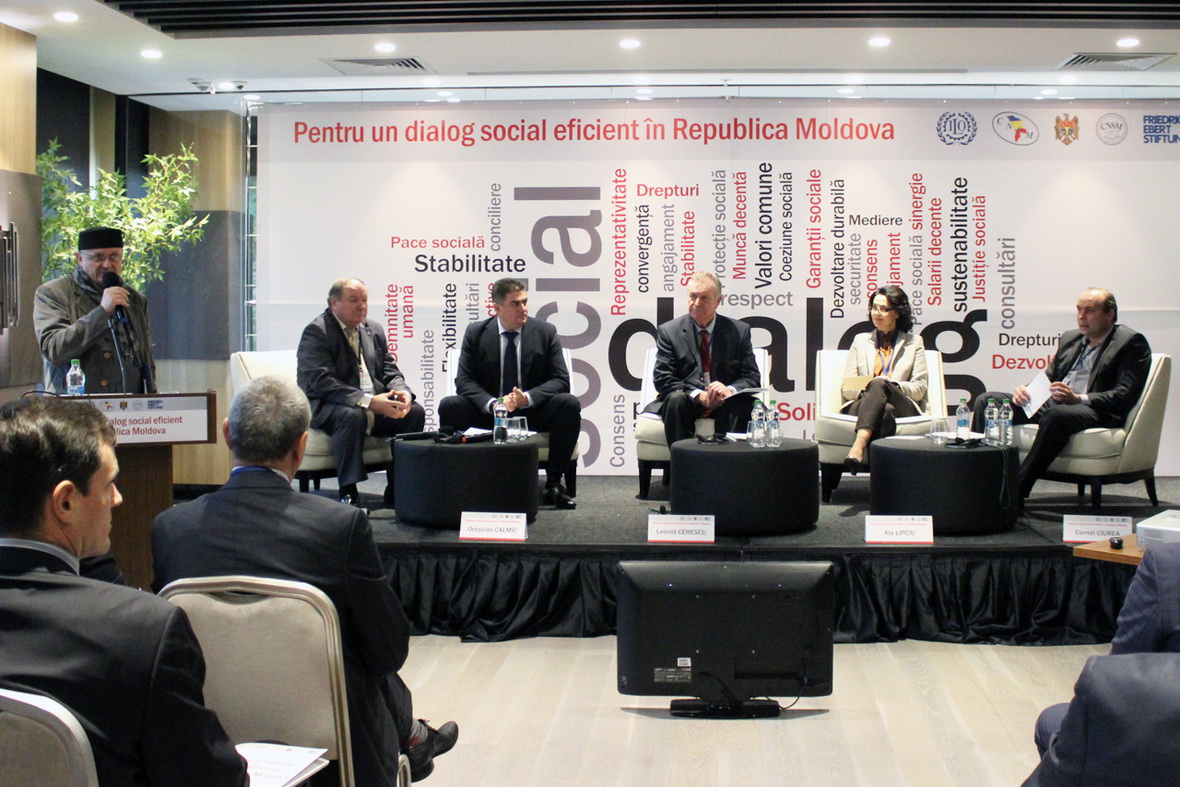Social partners call for effective social dialogue
The social partners – government, trade unions and employers – met on Wednesday, October 26, at the international conference entitled “Towards an effective social dialogue in Moldova”, to discuss the situation regarding social dialogue and European practices that can be overtaken.
The conference was attended by the Speaker of the Parliament, Andrian Candu, Head of European Union Delegation to the Republic of Moldova, Pirkka Tapiola, permanent representative of the International Labour Organisation (ILO) in Moldova, Ala Lipciu, government representatives, Stephan Meuser, representative of “Friedrich-Ebert-Stiftung” Foundation to Romania and Moldova, the board of the National Trade Union Confederation of Moldova (CNSM) and the National Confederation of Employers of Moldova (CNPM), presidents of national-branch trade union centres and foreign experts.
Those present discussed a number of aspects of social dialogue in Moldova, achieved results in this direction, dialog models implemented in different European countries, how social dialogue can be enhanced to provide society with an effective framework for solving social economic problems.
“Employers, trade unions and government should be partners, because together they create a system that needs compromises to work, from all actors involved in this dialogue. In this formula, the government plays the role of referee, but we are all allies of the need to promote vital projects,” said Speaker Andrian Candu.
Andrian Candu stressed that the partnership involves mutual respect and the ability to negotiate, not necessarily public confrontations that make compromise impossible. The speaker announced that they are currently working on a legislative initiative that will enable them to provide meal vouchers for employees, project previously proposed by trade unions.
Head of the EU Delegation to Moldova, Pirkka Tapiola, mentioned that the development of the social dialogue is a key element for the future of our country.
“We are glad that there is a real interest in the country’s leadership in this direction. Despite this, social dialogue is not discussed enough, and the society does not know its benefits. Our analysis shows that in many transition countries, social dialogue does not really work, but populism dominates. The efficient functioning of the social dialogue must be a priority for the authorities and social partners in Moldova,” said Pirkka Tapiola.
According to Stephan Meuser, representative of the “Friedrich-Ebert-Stiftung” Foundation to Romania and Moldova, the decline of social-economic direction of Moldova can be mitigated by involving social partners and civil society in a constructive social dialogue.
Petru Chiriac, vice president of CNSM, spoke about the role of social dialogue, undertaken actions by trade unions and ways to boost social dialogue.
“The effectiveness of social dialogue depends largely on the functionality of social partners. In territories, at branch level, largely no dot exist employers’ structures, making it difficult to take important decisions for employees. There are also shortcomings in the functioning of the National Commission for Consultations and Collective Bargaining,” said Petru Chiriac.
In the same vein, Sergiu Sainciuc, vice president of CNSM, said that social dialogue should be developed not only at tripartite level, but also at bipartite level, at the branch level.
“As highlighted by foreign experts it is very important to have a constructive social dialogue. Only through constant social dialogue can be solved the most pressing issues in society. For this, it is necessary to have strong and equal partners. There is still a lot of work on the size of adjusting the national legislation to EU requirements, improve the situation in terms of health and safety at work, providing citizens with decent working conditions,” said Sergiu Sainciuc.
Leonid Cerescu, CNPM president, noted that employers have reservations about the outcomes of social dialogue but stressed the role of this process for all the society.
“Although we have some shortcomings on the functioning of social dialogue, it is necessary to recognize that some results were obtained. To enhance social dialogue there should be better communication between all social partners”, says Cerescu.
In this context, Octavian Calmic, Deputy Prime Minister, Minister of Economy, said that he encourages and supports the development of bipartite social dialogue.
Referring to the quality of social dialogue, Ala Lipciu, permanent representative of ILO, said that in the Republic of Moldova the freedom of association is still restricted.
“There are many discussions about the role and necessity of the State Labour Inspectorate, there are no mechanisms for amicable settlement of labour disputes, another problem is the visibility and attractiveness of social partners and the lack of a communication strategy with the public – these are just some of the barriers that hamper the development of social dialogue,” stressed Lipciu Ala.
Kostas Papadakis, main specialist of the ILO, Geneva, stressed that in order to improve social dialogue it is essential to enhance the capacity building of social actors, reduce state intervention in the social dialogue process, take over the commitment at the highest level, hold regular meetings between the social partners, monitor the achieved results from these meetings, develop the respect among partners and of consensus in relations.
In the end the parties agreed on submitting the efforts needed to realize certain actions to increase the capacity of social partners and strengthen institutional mechanisms of social dialogue and agreed to continue discussions in 2017 about the string results that will be obtained after the event.
International Conference “Towards an effective social dialogue in Moldova” was organized by the “Friedrich-Ebert-Stiftung” Foundation and ILO, in partnership with CNSM and CNPM.
Department of mass media and international relations



